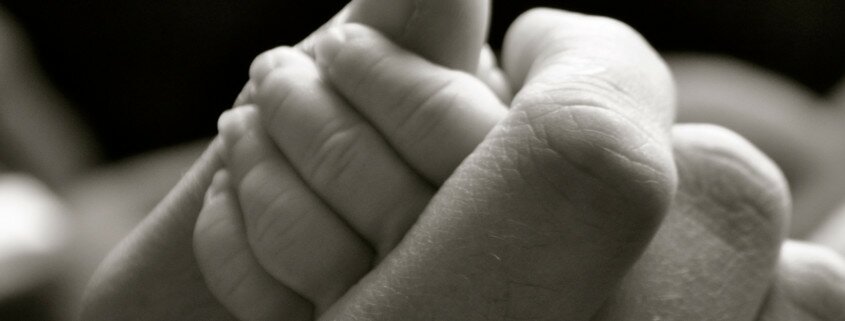Jenny’s Story
You will be well.

In 2003, following an incredible and happy pregnancy, I gave birth to my first son, Jake. I was 30 years old when he was born and had waited a long time to have him. I have always been a positive, upbeat person ready for whatever life throws at me. However, I was completely blindsided by my state of mind and emotions after the birth of the baby. Nobody really talks about this — there is a stigma associated with being “anything but happy” following the birth of a new baby. Others cannot understand why you “are behaving this way”. . . but you can provide no answer because you don’t understand it yourself. Some women have felt this way before, but some will experience this for the first time following delivery OR in connection with pregnancy-related hormonal shifts. It is just as frightening and debilitating regardless of when it occurs.
“My sleep deprivation was severe — about 4-5 hours of interrupted sleep during a five-day period. Is it any wonder a body and brain start to shut down or go “haywire” with that kind of neglect?”
I could not have been more happy when my son arrived healthy and smiling. But I soon began to feel overwhelmed by this new role, knowing that my life would never be the same again. Within ten days of delivery, I began to feel completely exhausted and out of control. My sleep deprivation was severe — about 4-5 hours of interrupted sleep during a five-day period. Is it any wonder a body and brain start to shut down or go “haywire” with that kind of neglect? I can see that now, but at the time, I felt like a robot going through the motions unable to understand why I felt this way. Things were bad enough that I sought help. I suffered from postpartum obsessive compulsive disorder, depressive symptoms, and atypical psychosis. I had no history of problems with depression and had never experienced hallucinations before. It was a scary experience, and I will never underestimate the value of a good night’s sleep again.
My postpartum episode was the most transforming experience of my life so far. I learned some valuable things about me and about life. . . I learned to ask for and accept help . . . I learned that our brain and physiology can behave in bizarre ways that reflect a biological imbalance beyond our control. . . I learned that none of us know what combination of stress and life events will drive us to a “scary place” of not being able to control thoughts and feelings.
As a counselor by profession (LMSW), I understood the broad range of human affect and mood that a person can go through. It’s one thing to read about it and treat others . . . quite another to live it yourself and feel so helpless despite everything you know and have learned. When your body is in a state of imbalance, it is not a reflection of you or anything you have done wrong. Despite everything we know, the brain and body will do what it pleases sometimes. If you had a headache, you’d take a Tylenol. If you had diabetes, you might use insulin. You wouldn’t think twice about doing those things to care for yourself, so why should you if your brain is producing more or less of a particular neurochemical than it should be? At one point, that finally made sense to me. I knew I just wanted to feel like my “normal” self again (whatever that is).
Seeking help is a strength and not a weakness — we are better women and moms when we take care of ourselves. You do not have to suffer alone. Your instincts are usually on target and become very clear if you tune out messages from society or others about what you “should” do or how you “must behave”. Just talking to someone who isn’t judging of you or what you are going through is very important. Remember that you know better than anyone how you are feeling right now and you have the right to seek help if you need it.
In 2003, I looked for a postpartum support group but found nothing. I vowed that this lack of support would change one day — especially for a city as large as Wichita. Some time later, I connected with Meeka (PPRC’s founder) and other PPRC volunteers. We now have a support group in place in Wichita and other exciting outreach efforts taking place. Never underestimate what a group of committed women can do when they share a common goal.
Support from other caring women and friends was a big part of my healing. I didn’t feel as alone in my experience and adjustment to becoming a parent. I am amazed at how many women I have talked to since then who have experienced difficult postpartum mood changes — women who appeared so strong and “all together” while inside they carried an enormous burden. There is great comfort in coming together to support one another — we don’t do that often enough. I have had the blessing of connecting with other PPRC volunteers and have developed authentic and lasting friendships over time.
Remember that you are not alone . . . you are not to blame . . . and you will feel better. You will start to see a light at the end of the tunnel. Seeking help can make this happen sooner versus later. For me personally, taking the first step was difficult, but once I did, the path unfolded before me with more support than I ever imagined.
I could not have been more happy when my son arrived healthy and smiling. But I soon began to feel overwhelmed by this new role, knowing that my life would never be the same again.